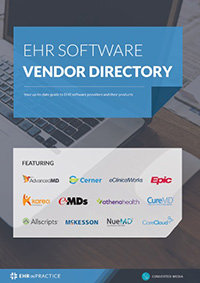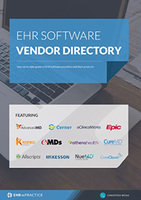3 Misconceptions about EHR and Interoperability
EHR promotes interoperability between providers, hospitals, and pharmacies by providing a platform through which patient information can be shared securely and efficiently. However, implementing EHR does not guarantee providers will be prepared for interoperability. This is a common misconception and it is not the only one that plagues EHR interoperability.
All EHRs Meet Meaningful Use Interoperability Requirements
A common mistake is to assume all EHRs meet the interoperability requirement for Meaningful Use. With the 2015 Omnibus Appropriations bill passed in December 2014, the Office of the National Coordinator for Health Information (ONC) now has the power to decertify any EHRs that inhibit information sharing.
If an EHR cannot share patient information securely between other physician offices, hospitals, labs, and pharmacies, then it is not capable of interoperability. Make sure your EHR is up to code and that it is not on the chopping block for decertification. Check out the Certified Health IT Product List from The ONC for a comprehensive overview of current EHR certifications.
Our EHR software comparison can also provide you with a side-by-side comparison of the certification status of selected systems.
All EHRs Approach Interoperability in the Same Way
In the words of the ONC, “interoperable health information exchange is not a ‘one-size-fits-all’ solution.” Not every EHR is built the same way and not every EHR will be right for each physician, hospital, pharmacy, etc. Simply having an EHR that keeps data in a structured format is not enough, interoperability depends on the manner in which the EHR is implemented and used.
interoperable health information exchange is not a ‘one-size-fits-all
EHR can be implemented and configured differently depending on the physician’s needs for his or her practice. The ONC asks that practices consider several questions when implementing EHR. These questions are important to answer and address prior to EHR implementation to ensure the interoperability potential of the selected EHR remains intact.
If you have niche requirements for your EHR, these must also be accommodated within a framework of interoperability. Information required in patient records should be readily available and securely shared between practices, hospitals, and pharmacies no matter how niche that data is.
Implementation of EHR Equals Interoperability
Implementing EHR is not easy and interoperability will not be achieved simply through the implementation process. The ONC offers advice on other areas of EHR projects which are vitally important for EHR interoperability including staff training, which can be paid for with funding if a practice meets certain criteria.
Staff training offered includes several interoperability courses. These can allow your EHR users to familiarize themselves with new terms and workflows. If each staff member does not understand their role in entering information into the EHR, sharing information will be made considerably more difficult.
If physicians, practices, and hospitals do not consider these misconceptions and address them prior to EHR implementation, each may affect the level of interoperability achieved. Because each EHR takes a different approach to interoperability, understanding the requirements of the practice is crucial. Have an EHR tailored to specific needs and succeed, forget about these needs and the project will falter.
Free white paper

EHR Vendor Directory
Get the most up-to-date directory of EHR software vendors. Find the best software for your practice.

Featured white papers
-

EHR Implementation Template
Get all the planning tools you need to make your EHR implementation a success
Download -

EHR implementation: 6 steps to success
Step-by-step information on how to implement EHR effectively
Download -

EHR Vendor Directory
Get the most up-to-date directory of EHR software vendors. Find the best software for your practice.
Download
Related articles
-

EHR Implementation Plan: Your 8-Step Checklist
Your comprehensive checklist for creating an EHR implementation plan.
-

A template for your EHR project implementation timeline
Determining your EHR project timeline will prove tricky, but having some expectations of time fra...
-

5 important areas of EHR training during implementation
Successful EHR implementation is not possible without crucial EHR training

